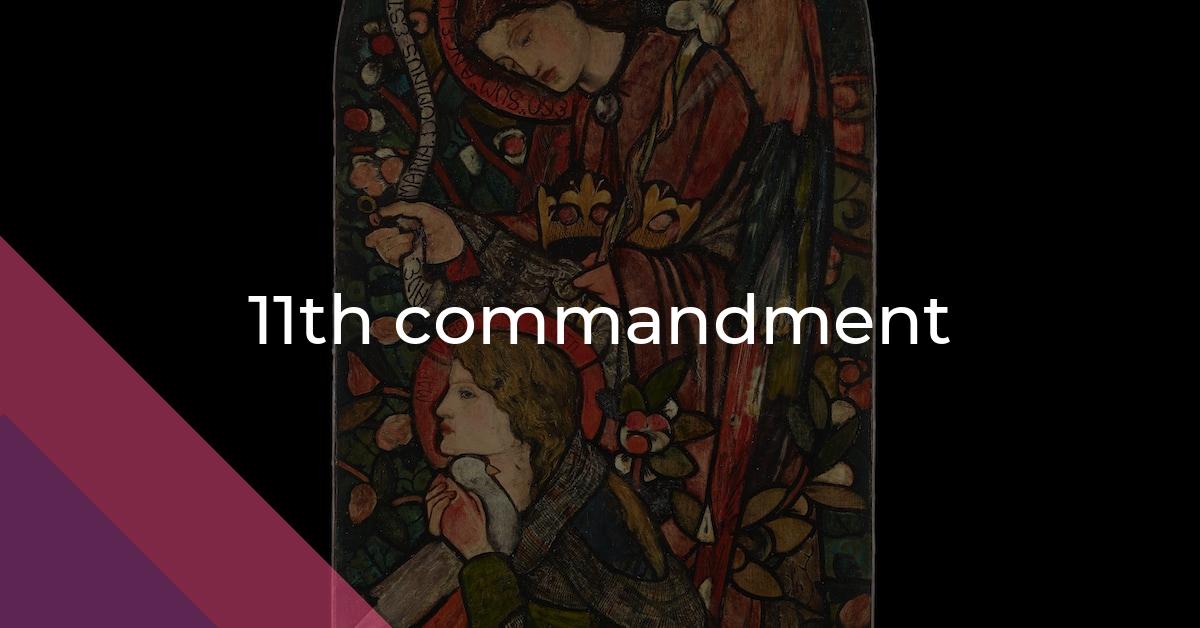11th commandment: Idiom Meaning and Origin
What does ‘11th commandment’ mean?
The idiom 11th commandment refers to an additional rule or principle that is not explicitly stated but is widely understood or expected to be followed.

Idiom Explorer
The idiom "you know what" is used as a phrase that often indicates that the speaker is trying to avoid saying something explicitly, assuming the listener already knows or will understand the unspoken message.
An idiom meaning in the way that something is done or in a particular style.
The idiom "up to eleven" means to push something to its maximum limit or intensity.
This idiom, "thus and so," is used to describe a way of doing things or a specific method to achieve a desired outcome. It emphasizes the idea of following a particular order or procedure.
The idiom "stand on ceremony" means to adhere strictly to formalities or traditions, often in a way that is considered unnecessary or excessively polite.
The idiom "rule of thumb" means a general principle or guideline that is widely accepted and used in a particular context, often based on practical experience rather than precise measurements or exact rules.
The idiom "one's word is law" means that a person's statement or promise is considered absolute and must be obeyed without question.
The idiom "not to mention" is used to introduce an additional point or example that strengthens a previous statement. It implies that the point being added is so obvious or well-known that it doesn't need to be explicitly stated.
The idiom "nine times out of ten" means that something is very likely to happen, but there is still a small chance it may not. It suggests a high probability or likelihood, but acknowledges the existence of some potential exceptions.
The idiom "matter of course" means something that is expected or natural and happens without any need for explanation or special attention.
Uncovering the Lost Directive
The idiom "11th commandment" has a distinct history associated with it, although its origin remains uncertain. The phrase is used to convey an unwritten rule or principle believed to be as important as the Ten Commandments mentioned in the Bible. It can be traced back to at least the mid-19th century.
One theory suggests that the idiom emerged to emphasize the significance and authority of rules or beliefs not explicitly stated in religious texts. By adding an eleventh commandment, individuals convey unparalleled importance or moral duty. This interpretation aligns with the belief that the Ten Commandments set forth fundamental principles of morality and that an eleventh commandment would serve as a metaphorical expansion of those principles.
Another possibility is that the idiom originated as a play on the expression "breaking the eleventh commandment." This expression means engaging in ethically or morally wrong activities. It highlights the notion that the existing ten commandments are comprehensive and cover a wide range of moral obligations. In this context, any transgression not mentioned in the Ten Commandments can be seen as a breach of the unwritten 11th commandment.
The idiom "11th commandment" has found its way into political and social discourse. It suggests the existence of an unspoken rule or ethical guideline that should not be violated. It reinforces the importance of adhering to certain principles or values. The idiom has evolved to represent a concept beyond religious connotations, emphasizing the existence of an abstract moral or ethical code that goes beyond what is explicitly stated.
Related to the idiom "11th commandment" is the expression "rule of thumb." The rule of thumb refers to a general principle or rule based on experience rather than strict scientific measurement. It originates from the practice of using the width of a thumb as an approximate measure. Just like the idiom "11th commandment," the rule of thumb represents an unwritten guideline that is widely accepted and followed.
Another related idiom is "eleventh hour." This phrase refers to the last possible moment or the final opportunity to take action. It is often used when describing a situation where time is running out. The idiom "eleventh hour" shares a common theme with the "11th commandment" in that it signifies the importance of acting promptly and not delaying actions until the last moment.
To summarize, the idiom "11th commandment" conveys an unwritten rule or principle believed to be as important as the Ten Commandments. Its exact origin remains uncertain, but it has found its way into contemporary language usage, particularly in political and social discourse. It is used to suggest the existence of an unspoken rule or ethical guideline that should not be violated, emphasizing the importance of adhering to certain principles or values. The related idioms "rule of thumb" and "eleventh hour" further exemplify the significance of unwritten rules and the importance of timely action.
Example usage
The idiom "11th commandment" means an unwritten rule or guideline that is not officially recognized but is commonly understood or accepted. Here are three examples of how this idiom can be used in a sentence: 1. "In our office, we have an unwritten 11th commandment: never speak ill of your colleagues behind their backs." 2. "While there are ten official rules of the game, experienced players know there's an 11th commandment: always keep your eye on the ball." 3. "When it comes to family gatherings, there seems to be an unspoken 11th commandment: never discuss politics at the dinner table."
In various contexts, the idiom "11th commandment" is used to refer to an unwritten rule or guideline that is commonly understood or accepted by a certain group of people, even though it is not formally recognized. It implies that there is an additional commandment beyond the initial ten commandments, which are considered to be the primary religious or moral directives.
Example 1 illustrates the use of the idiom in a workplace setting. The sentence suggests that within the office, there exists an unspoken rule or guideline, often referred to as the 11th commandment, which advises against speaking negatively about colleagues when they are not present.
The second example demonstrates the idiom being applied in the context of a game. While there are officially ten rules of the game, experienced players recognize an unwritten 11th commandment that emphasizes the importance of keeping focus on the ball at all times.
The third sentence utilizes the idiom within the framework of a family gathering. It suggests that there is an unspoken rule, known as the 11th commandment, which discourages engaging in political discussions during meals with family members.
Overall, the idiom "11th commandment" serves to highlight the existence of unspoken rules or guidelines that are commonly understood and accepted within specific contexts.
More "Religion" idioms



